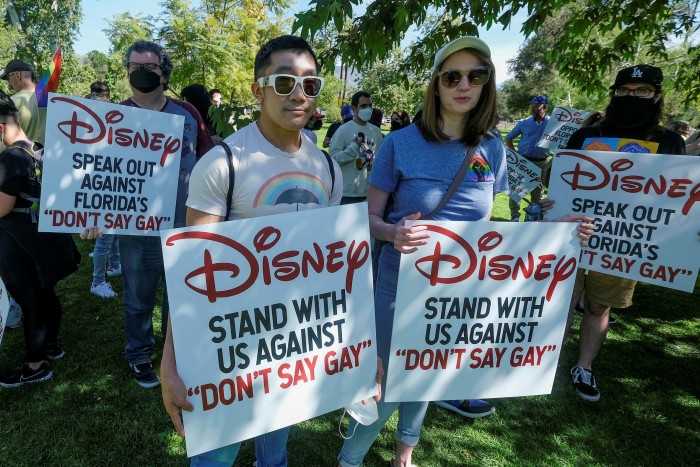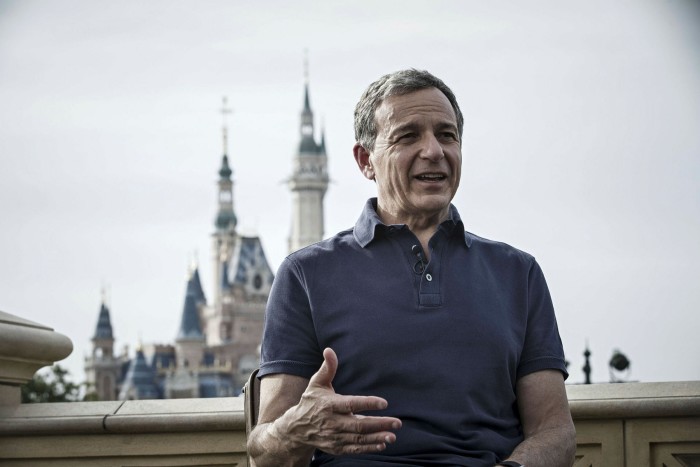When Walt Disney became one of the first US companies to offer healthcare benefits to the same-sex partners of its employees back in 1995 the move was hailed as a big moment in the American gay rights movement.
Not everyone was in favour — some conservative Christians saw it as evidence that Disney supported “antifamily values”. But the policy inspired decades of loyalty among the company’s LGBTQ staff.
Almost 30 years later, Disney is embroiled in another controversy over its support of the LGBTQ community. This time it is facing perhaps the worst public relations crisis in its 100-year history — and now the criticism is coming from across the political spectrum.
“In a short period of time they managed to piss off both the left and the right,” says a former senior Disney executive.
The goodwill the company had built among its LGBTQ employees has been stretched to breaking point following its botched response to a proposed Florida law, labelled “Don’t Say Gay” by its critics, to restrict discussion of sexual or gender identity in primary schools.

Disney’s initial reluctance to speak out against the bill, which was viewed as dangerous and discriminatory by staff at its Orlando theme parks, prompted walkouts and an outcry by rights activists. But when the company reversed course and condemned the bill it found itself in the crosshairs of the right.
Led by Florida’s governor, Ron DeSantis, the state’s Republicans — including several who had accepted campaign contributions from Disney in the past and reliably voted for legislation the company backed — have turned on the company.
Rightwing commentators went on the attack, sometimes using inflammatory language. The conservative journalist and activist Chris Rufo has declared “moral war against Disney” and published leaked videos from an internal meeting in which a Disney employee talked about her “not-so-secret gay agenda”. Fox News presenter Tucker Carlson claimed that sounded like “the behaviour of a sex offender”. Others have accused the company of producing content aimed at “grooming” American children.
The crisis is the result of what Disney officials now acknowledge was a failed attempt to placate its employees while also avoiding taking a public stand on one of the most divisive issues in US politics.
DeSantis, who is up for re-election this year and thought to be eyeing a White House run in 2024, has slammed Disney as a “woke” corporation. This spring he signed legislation to strip the company of the special tax status that allows it to govern the area around Walt Disney World theme park in Orlando. Other Republican lawmakers are taking aim at some copyright protections for Mickey Mouse.
It looks as though critics are causing Disney serious reputational damage: a recent survey of Americans’ views of corporations by Axios and the Harris Poll shows Disney’s public image dropped from 28th place last year to 65th in 2022.
How did one of the world’s most beloved family brands find itself in this position? The answer lies in a series of unexpected social and political shifts for a new generation of employees who believe the companies they work for should be agents of social change — and in a Republican party whose loyalty to corporate America is no longer certain.
Confronted with these changes, Disney, a company that has adeptly shaped popular culture for nearly a century, badly misread the moment.
‘Don’t Say Gay’
The controversy has piled pressure on Disney’s chief executive, Bob Chapek, who took the reins from Bob Iger in 2020, only weeks before the Covid-19 pandemic forced a near-shutdown of the company. Having survived that, Chapek had hoped to put his own stamp on the company this year following Iger’s departure as chair emeritus. Instead, he has found himself leading Disney through a new and unpredictable phase of America’s raging culture wars.
The trouble began on January 11 when Joe Harding, a Republican legislator from the small town of Williston, Florida, introduced a four-page bill known as the Parental Rights in Education act in the Florida House of Representatives. It landed amid a roiling national debate about gender-neutral bathrooms, transgender participation in school sports and “gender-affirming” medical procedures.
In mostly vague terms the bill called for guidelines to inform parents about “decisions affecting a student’s mental, emotional or physical wellbeing”. But it also included this line: “a school district may not encourage classroom discussion about sexual orientation or gender identity in primary grade levels or in a manner that is not age-appropriate or developmentally appropriate”.

LGBTQ rights activists were worried. Ryan Thoreson, a lawyer at Human Rights Watch, says the bill is less about protecting young children than shutting down conversations about LGBTQ issues in schools. Such discussion has previously been “at teachers’ discretion”, Thoreson says. “The Florida law intentionally leaves teachers without a sense of what is and isn’t permissible.”
Anna Eskamani, a Democrat who represents Orlando in the Florida House, says soon after the bill was introduced she began to hear from concerned LGBTQ Disney World employees in her district, many anonymously, who were “frustrated by Disney’s lack of attention to this”.
Concerns began to surface at Disney’s headquarters in Burbank, California, at the beginning of February. An executive at Disney World suggested the company could soothe employee nerves if it signed a public letter, circulated by the LGBTQ advocacy group Human Rights Campaign, which allowed corporations to register their opposition to bills such as this one. Big companies including Apple and Amazon had been among the first to sign on.
But that idea was rejected by Geoff Morrell, who had arrived at Disney in late January as its new head of corporate affairs, according to three current and former Disney executives.
Morrell is a registered Republican and, although he worked for the Obama administration, he started at the Pentagon under Robert Gates, George W Bush’s defence secretary. He argued that Disney, one of the last “unifying” brands, should avoid taking stands on hot-button cultural issues. Morrell wanted to let the company’s formidable team of 38 lobbyists in Florida work behind the scenes to soften the bill — if not kill it altogether.

The decision not to sign the letter was a big mistake, say current and former Disney officials. Doing so would have eased internal tensions without attracting heat from Florida Republicans, they argue. Others who were aware of the discussions dismiss this as revisionist history, reasoning that Disney’s signature would have probably been turned into an issue anyway.
Still, Disney’s public silence started to seem more conspicuous at the end of February, when Iger retweeted a two-week old statement from President Joe Biden condemning the “hateful” bill. “I’m with the president on this,” wrote the former chief executive, who remains an influential figure in Hollywood. “If passed, this bill will put vulnerable, young LGBTQ people in jeopardy.”
At Disney HQ, alarm bells started ringing.
The three Cs
Iger’s tweet would not in itself have been surprising to anyone who had followed his 15-year career at Disney’s helm. His progressive politics were well known in Hollywood and beyond. Over the years he had spoken out on social issues, including abortion rights, gun control and LGBTQ rights, usually in a strategic manner that appeared to advance his employees’ interests without landing the company in political trouble.
But Chapek was left in an awkward position by the tweet, which came on the same day the Florida Senate began considering the bill. An internal debate began over when, or whether, Chapek should issue a statement. “Bob kept asking when to take a more public position,” says a person who was involved in the discussions.
Morrell contacted Disney’s lobbying team in Tallahassee, the state capital, to find out what was happening in the Senate. The next day, a Disney-friendly Republican senator named Jeffrey Brandes, who was not seeking re-election, filed an amendment proposing to remove the words “sexual orientation or gender identity” from the bill and replace them with “human sexuality or sexual activity”. It was rejected by his fellow Republicans.
Both within the company and outside it there was surprise to see that Disney’s efforts to water down the bill were not working.

In the 55 years since Walt Disney and his older brother Roy chose Florida as Disney World’s home, the company “has pretty much been able to get everything they wanted from the Florida government”, says Aubrey Jewett, an associate professor of political science at the University of Central Florida. “If anybody was complaining about Disney it would usually be coming from Democrats and progressives,” he adds.
Disney has been a generous donor to Florida’s politicians and their campaigns. Among them is DeSantis, who received about $100,000 in contributions from Disney between 2019 and 2021. But a number of other influential Republicans who have tended to vote for Disney’s favoured legislation seemed immune to its lobbying this time.
“This is where [the Republican party] is right now,” says one senior Disney adviser. “If you have someone with the gravitational pull of DeSantis pulling you in one direction and you go the other way, you now have a problem.”
As the bill made its way through the Senate, Chapek began to feel more pressure from his employees. In early March, he met with a small group of Disney LGBTQ leaders to discuss the bill: “It is a conversation I will not forget,” he told staff.
Neither is he likely to forget the events of the following week, which became the defining period of his tenure. On Monday, March 7, he issued a memo to staff acknowledging employee “disappointment” that Disney had not condemned the bill. Yet he defended the decision by saying — prophetically, as it turned out — that corporate statements “are often weaponised by one side or the other to further divide and inflame”.

Instead Disney’s most effective tools to effect change, the memo said, were the “three Cs” — a concept Morrell had come up with — which included content, corporate culture and support of diverse community organisations. The reference to content angered creatives at Disney, including animators at Pixar who noted that the company frequently cut out or minimised gay or lesbian characters in their work.
The day after the memo was released, the bill passed the Florida legislature. Furious employees planned walkouts and asked why Disney had contributed funds to Republicans who voted for the bill.
At the company’s AGM the next day Chapek noted that “weeks of effort” to neuter or kill the bill had been unsuccessful but, with employee anger still at fever pitch, he sent out another memo to staff on Friday, March 11. This time the tone was straightforwardly contrite.
“You needed me to be a stronger ally in the fight for equal rights and I let you down. I am sorry,” he wrote, announcing that the company would suspend its political donations in Florida and review its strategy for contributing to campaigns in future.
It was the cue DeSantis needed to scale up his attack on “woke” Disney. The company, he said, is “going to criticise the fact that we don’t want transgenderism in kindergarten and first grade classrooms . . . that’s the hill they’re going to die on”.
DeSantis’ campaign has raised more than $50mn this year as his national profile has grown, according to state election records, dwarfing Disney’s contributions.
Course correction
Reflecting on the debacle, a Republican senator in Florida put the blame squarely on the company. “Disney was listening to certain stakeholders and got the wrong comms advice. They should have stayed quiet,” he told the Financial Times in May.
Chapek has been in course-correction mode ever since. He began by ousting Morrell at the end of April. Disney’s PR is now being run by Kristina Schake, who handled communications for Michelle Obama while she was First Lady and worked for Hillary Clinton during her failed 2016 presidential run.
Before that she ran an LA-based PR group with Chad Hunter Griffin, who had a stint as head of Human Rights Campaign, the group behind the letter condemning anti-LGBTQ legislation. Schake and Griffin had also worked on the successful effort to overturn California’s Proposition 8, which banned same-sex marriage.
Chapek embarked on a “listening tour” that took him to the headquarters of Pixar, ESPN, Disney World and other divisions. He created an LGBTQ task force at Disney — a group of 30 executives who are examining the company’s content and its internal culture — and met with small groups of LGBTQ employees who shared stories about facing discrimination.

“He knows that trust was broken, and we have spent the past few months trying to build it back up,” says a member of the task force.
But Chapek also has his own position to worry about. With less than eight months left on his contract, he has to contend with a rattled workforce and a sagging share price — the stock is down nearly 50 per cent over the past year amid investor concerns about slowing growth in the streaming industry. Hollywood has been rife with speculation about whether he will last.
In early June, two moves were made to strengthen Chapek’s position. First was the revelation that he had sacked Peter Rice, Disney’s top TV executive. Rice is well-liked in the creative community and there had been open discussion in Hollywood that he might succeed Chapek.
Second, Disney’s board released a statement of support for Chapek. “Bob and his leadership team have the support and confidence of the board,” wrote the chair, Susan Arnold.
Chapek will need all the support he can get. With the midterm elections looming in November, issues including race, abortion, guns and LGBTQ rights will dominate the debate on the left and right. This means the image of “woke” Disney is likely to remain in the political spotlight, says Anthony Kreis, a law professor at Georgia State University.
“The issues around Disney are going to get litigated ad nauseam” during the campaign, says Kreis, who writes about civil rights and politics. “There’s no winning strategy here for them.”
Additional reporting by Kiran Stacey
For all the latest Business News Click Here
For the latest news and updates, follow us on Google News.

